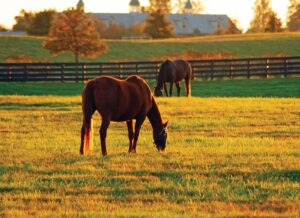When riding horses, balance is key.
If a rider doesn’t have balance, it affects feel, stability, and control while in the saddle. An imbalance of the bit, reins, and weight in the saddle can all have an impact on how a horse moves and reacts, even if not noticeable to the eye. The same can be said for equine nutrition. An imbalance in feed, supplements, hay, or water can start to cause internal changes that affect ability to perform as well as overall equine health. Balance is key to a successful nutritional program for your horse.
Balanced nutrition for horses seems relatively simple, and it should be, as feed companies have done much research into exercise physiology, breed specifics, and geriatric studies. While this has helped to create more focused feeds, there are still additional factors that must be taken into consideration in choosing the right feed, including breed, age, discipline, work intensity, fitness level, and geography. Stall and pasture time are also key factors.
There is no bag of feed that alone can provide all needs for all horses. Therefore, supplements may be utilized to provide additional nutrition based on the individual horse. It is important to know the effect of mineral interactions, as the use of several supplements at one time can have the potential for toxicity caused by an imbalance of micro and macro minerals. This is called mineral interference, which can negate the absorption of another linked mineral. As humans, we tend to think that more is better — if one gram is good, then 2 grams must be better. But that is not true. For instance, if we over-supplement with iron, this can interfere with the absorption of zinc, which then can interfere with calcium, which interferes with phosphorous, and so on. This chain reaction interferes with mineral synergy. And to think, that all started with one iron supplement.
Another factor to consider is the quality of forage. When it comes to the visual inspection of hay, it is thought that green is good and brown is bad. But even if hay has a good green color, we do not know the level of nutrition that bale of hay provides by just looking at it. Caloric content, lignin levels, balanced calcium/phosphorous, ADF/NDF, and wet chemistry analysis, among other factors, are what we look for in a well-balanced hay. An average equine diet is made up of 80% forage and 20% concentrate (in pounds). Hay does not come with a feed tag, so in order to know specifics, your hay should be analyzed to determine the level of nutrition going into your horse.
Speaking of feed tags, what you find on a bag of feed does not tell the whole story. For years, people have talked about grain based solely on protein levels. There are many 10% protein feeds that can out-perform 14% protein feeds due to the quality of the amino acid balance. Lysine, methionine, and threonine are the first limiting amino acids. If any of these are deficient, the horse cannot make full use of other amino acids, which impacts muscle health, hair coat, and quality.
Continuing with feed tag analysis, don’t fall for tricky fiber claims. All fibers have different digestibility and absorbency rates. For example, oat hulls only have a 30% digestibility rate, whereas soy hulls have up to an 85% digestibility rate. So, out of the 100% of fiber in a bag of feed, if your horse is only using 30%, the other 70% ends up in your wheelbarrow.
Every ingredient, be it a protein, a fat, a carbohydrate, or a fiber, plays an important part of the overall balance in the diet of your horse. In future installments, we’ll get into more specific details about these individual components. This information is just a drop in the proverbial drop in the bucket. In the future, more specifics will be featured.
Happy Trails.






